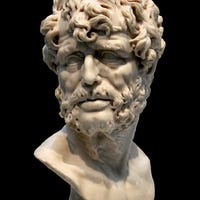
Welcome back to Mid-Week Meditations, Lifehacker’s weekly dip into the pool of stoic wisdom, and a guide to using its waters to reflect on and improve your life.
This week’s selection comes from Seneca. In his Moral Letters (88.7), he describes the real lessons to be learned from Homer’s The Odyssey:

Do you raise the question, “Through what regions did Ulysses stray?” instead of trying to prevent ourselves from going astray at all times? We have no leisure to hear lectures on the question whether he was sea-tost between Italy and Sicily, or outside our known world (indeed, so long a wandering could not possibly have taken place within its narrow bounds); we ourselves encounter storms of the spirit, which toss us daily, and our depravity drives us into all the ills which troubled Ulysses. For us there is never lacking the beauty to tempt our eyes, or the enemy to assail us; on this side are savage monsters that delight in human blood, on that side the treacherous allurements of the ear, and yonder is shipwreck and all the varied category of misfortunes. Show me rather, by the example of Ulysses, how I am to love my country, my wife, my father, and how, even after suffering shipwreck, I am to sail toward these ends, honourable as they are.
What It Means
Scholars and students—from ancient times to this day—toil away trying to figure out and remember all the names, dates, and locations from Homer’s epic, but all those details are beside the point. Take a closer look at this line:
Show me rather, by the example of Ulysses, how I am to love my country, my wife, my father, and how, even after suffering shipwreck, I am to sail toward these ends, honourable as they are.
To Seneca, the real lessons of this story are the moral lessons. I know, surprising right? The Odyssey isn’t about cyclops monsters, Trojan Horses, or braving stormy seas; it’s about love, honor, temptation, hubris, and perseverance.
What to Take From It
Back in school, teachers may have quizzed you on details from a book, lecture, tour, or film to see if you actually paid attention to the material. It’s a system that sometimes works, but it engrains the wrong approach to education in our minds. Instead of focusing on the real lessons of a story—the why—we instead learned to note the who, what, when, and where. We learned to “study for test.” It’s time to stop that if you haven’t already.
Advertisement
Most of us are out of school now, and there are no longer tests for us to study for. It’s time you learn to study just for you. When you read books, watch movies, and see plays, look for ways to apply the lessons the characters learn to your own life. Unless you plan on being a quiz show winner, there’s no need to remember all those little details that don’t make you a better person.
from Lifehacker http://bit.ly/2nstJnS
via IFTTT
